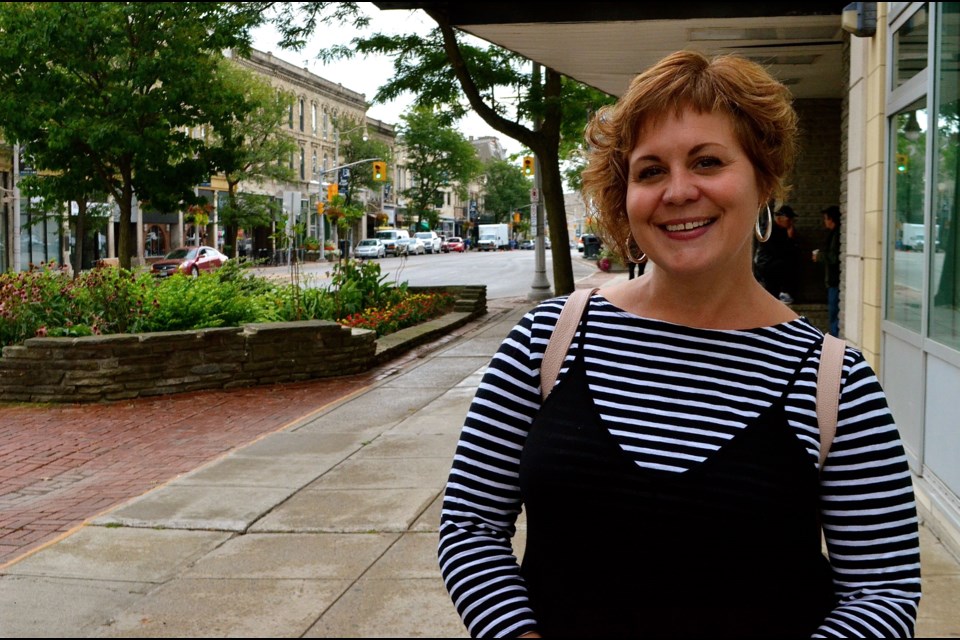Outreach peer worker Jenn Greenwood draws on her own experiences with addiction and homelessness to understand and empathise with the people she serves.
“I came to Guelph to go to treatment at Stonehenge,” said Greenwood. “I have been clean or abstinent since I left that program. I decided to make Guelph my home and I’ve been here ever since.”
For the past three years Greenwood has worked as a Specialized Medical, Addictions & Mental Health Outreach Services peer worker for the Guelph Community Health Centre.
“I have the experience to draw on and I’m encouraged to use it intentionally so, for me it is the perfect job because I get to be my total authentic self,” she said. “I don’t have to hide a part of me away.”
Greenwood has seen how the stigma associated with addiction, homelessness and mental health can have an unhealthy, even lethal, effect on people.
“Shame is what kills people and that is why the Stop the Stigma Rally (Sep 27 at City Hall) is so important,” said Greenwood. “When people live in shame in the shadows and they feel like they’re not worthy, they don’t access health care. They don’t access help and they die. People are dying on our streets.”
Restoring people’s dignity is an essential step toward restoring their hope and health.
“Our leadership team really supports the belief that everybody deserves support and healthcare,” she said. “It doesn’t matter where you find yourself in life. If you are a human being you deserve to have help but when people live in shame they don’t see that.”
Stigma contributed to the trauma Greenwood endured as a homeless addict living on the streets of Toronto, but she doesn't fit the pattern put forth by many leading addiction researchers such as Gabor Mate, who link addictive behaviour to early childhood trauma.
“My story doesn’t start with childhood trauma or heart ache or with parents who were addicts,” she said. “I had two parents who loved me and opportunities in life. What I know today is that addiction doesn’t discriminate. It doesn’t matter where you came from. It doesn’t matter what colour your skin is. Those things don’t matter.”
Having a loving family that reminded her of her self-worth was essential to her recovery.
“I think it is one of the things that saved me and helped me come out on the other side,” she said. “I am really, really lucky and I don’t hear that a lot with many of the stories I see every day.”
Greenwood was born into a middle-class family in Toronto in 1975, the oldest of two siblings. She began experimenting with drugs in her early teens.
“Truth is, I had been using substances of one sort or another since I was 13 but I did manage to finish high school,” she said. “I graduated from Western with a BA in arts, comparative literature and civilization.”
She had plans to be a teacher and graduated from the Montessori teacher’s training program but kept falling back on a progressively worsening pattern.
“At the end of high school, at the end of university, at the end of this teacher training for Montessori, I got back into drugs,” she said. “Crack and I.V. heroin use were sort of my things.”
Her addictions eventually took control of her life.
“In my mid 20s, the drug lifestyle took off for me and that is sort of where I ended up for many, many years,” she said. “I was going in and out of jail, living on the street and not really having a home for many years. I stopped using when I was 36.”
The treatment she received at Stonehenge Therapeutic Community in Guelph was life changing.
“I have not used a substance since Sep 21, 2011,” said Greenwood. “My anniversary date is coming up in a week or two. I thought I would probably go back to Toronto because my family is all there, but I decided to stay here and make Guelph my home – get a brand-new start.”
That brand-new start came in the form of a peer outreach position with the Sanguen Health Centre.
“I had 12 years on my resume where there was a gap with no proper employment so when I came out of treatment and had this opportunity with Sanguen and for somebody else to see some value in me and what I had to offer, really opened the door for me wanting to get into harm reduction and community work,” she said. “I’ve been there. I get it. I know what it’s like to feel like the system is against you. So, really a big part of my job is just relationship building and helping people to trust a little bit.”
The qualifications Greenwood brings to her work as an SOS peer worker were hard earned, but she is grateful for the opportunity.
“I kind of feel like I just fell into the work I am doing today but I think what keeps me going is that I have real hope for humanity,” she said. “I know that sounds so cheesy, but the best part of this job is the human connection and the relationships I get to build. I am so lucky that I just get to be me and if I can put a little kindness into somebody’s life or into our community, that’s a good job for me.”

.png;w=120;h=80;mode=crop)

